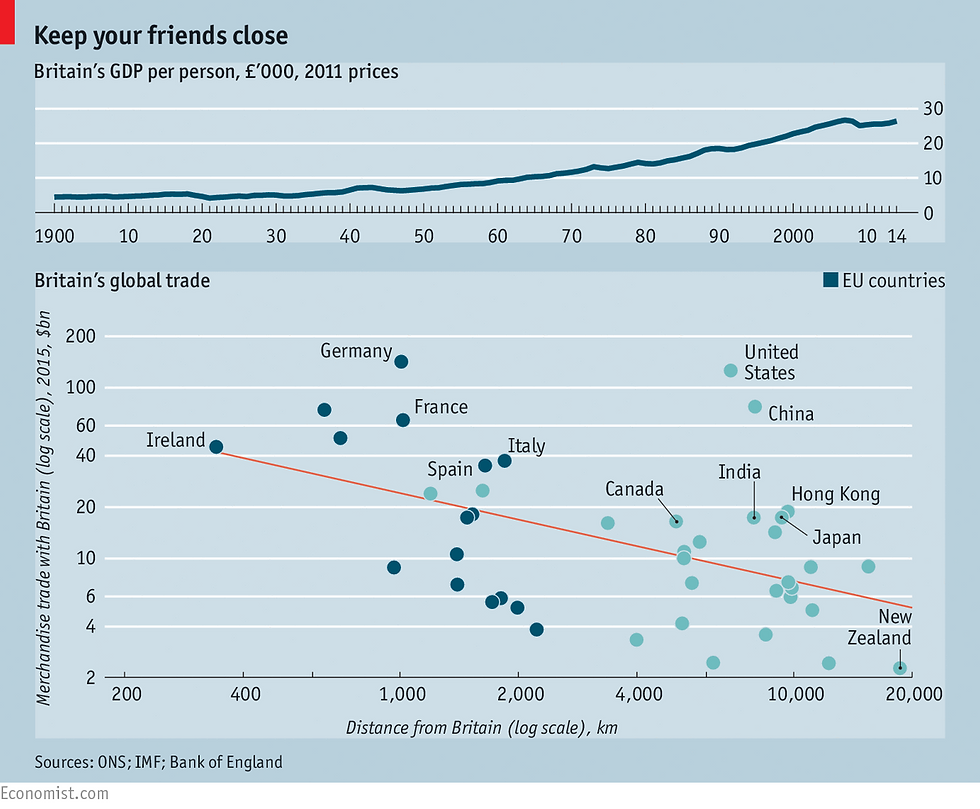The Who and Why of Brexit
- Cherie Aria
- Jun 22, 2016
- 6 min read
*This article was written before the Brexit referendum. It is a brief personal study note, posted here only for the purpose of education and discussion. However, the content of this report is original and the author of this piece owns the copy right.

Topic Background
Why is the referendum happening?
On January 23rd of 2013, UK Prime Minister David Cameron had promised that he would offer an in-out referendum, allowing the citizens to choose whether or not they should stay in the EU, if he were to win the re-election in 2015. He had claimed that the EU had violated the UK's sovereignty and was no longer in the UK's best interest, bringing up issues such as trade, immigration, financial and labor regulation and social spending. He said that he would renegotiate the membership of UK in the EU, and put the new deal to a referendum before 2017. He viewed the Eurozone debt crisis as an opportunity to renegotiate terms since that measures taken to save the Eurozone could drastically change the EU. While countries outside of the Eurozone recognized the need of such transformation, those inside of it should also understand that the UK needs to make changes in order to "safeguard their interests and strengthen democratic legitimacy."
As David Cameron has been re-elected as Prime Minister, he has to deliver his promise. On February 20th of 2016, he set the referendum to take place on June 23rd.
Who Are For a Brexit?
As previously mentioned, according to opinion polls, the public seems to be divided. The UK Independence Party (UKip) are sticking to their position of campaigning for a Brexit since before the election. The Democratic Unionist Party (DUP) also supports a Brexit, so are several Labor Party members of the parliament (MP). The Conservative party, which is led by Cameron, pledged to be neutral, and their opinions are split. Around half of their MPs are for a Brexit, among which are five cabinet members.
Who Are Against a Brexit?
Despite his former speeches, Cameron had recently confirmed that he is pro-European Union and would do everything in his power to keep the UK in the EU. He stated that staying in the EU could make the UK stronger, and sixteen of his cabinet members support his decision. The majority of the Labor Party, Scottish National Party (SNP), Plaid Cymru and the Lib Dems also hopes to stay in the EU.
Leaders of other members of the EU had also expressed that they would consider the UK leaving the EU a great loss and that it might even threaten the current Europe structure which had maintained peace ever since the World War. Donald Tusk, president of the European council said in an interview that he fears that “Brexit could be the beginning of the destruction of not only the EU, but also of Western political civilization.” In addition to other EU countries, President Barack Obama does not wish to see a Brexit either.
Arguments
Trade and Economy
One of the main reasons why people support leaving the EU is because they believe that the EU is holding the UK back by enforcing too many regulations on business and charging high membership fees. The EU, as a common market, not only has free trade in between member states, they also have common tariffs and trade agreements with non-member states. This means that the UK is not allowed to negotiate their own trade agreements with countries outside.
People who support a Brexit points to the fact that the UK's gross domestic product (GDP) has been experiencing a stable growth since the early 1900's. Neither joining the EU in 1973 nor being forced out of the European Exchange Rate Mechanism (ERM)[1] had affected the GDP of the UK negatively.
However, being inside this common market means, as previously mentioned, free trade with other EU member states. UK's membership with the EU is linked to up to 63% of its exports. 50% of the UK's exports are to other EU countries, while the other 13% are to countries that the UK are allowed to engage in free trade with because of existing free trade agreements between the EU and the countries. These are all large potential losses that may occur if the UK is to leave the EU.
Some argue though, that the trade and economy of the UK and the EU are interdependent. Seeing that 18% of exports in the EU goes to the UK, the UK is one of the most important markets within the EU. And because of the above reasons, some believe that it is highly likely for the UK to be able to strike other favorable deals with the EU after Brexit.
However, in order to prevent other countries from leaving the EU as well, European officials have recently promised severe consequences if the UK should choose to leave the EU in the imminent referendum. Wolfgang Schäuble, the German finance minister had firmly stated that “in is in- out is out,” and that he hopes and has faith that the people of the UK would make the right decision, which is to stay in the EU. Mr. Tusk also said that the UK would have to go through at least seven years of tough negotiation with the EU in order to build a new relationship in case of a Brexit. Not leaving a lot of room up to negotiation or ambiguity.
[1] ERM was a system of fixed exchange rate between currencies within the EU. After the euro was introduced, it evolved into ERM II. The objective being to peg the currencies of EU countries outside of the eurozone to the euro in order to gain stability. When facing a recession around 1990, the UK was forced to leave the ERM II. Currently, the only currency in the ERM II is the Danish krone.
Immigration and Border Control
Another reason why supporters of a Brexit are against staying in the EU is that they are reluctant to comply with the "free movement" policy of the EU, hoping to reduce the number of immigrants and migrant workers. The free movement policy is a fundamental principle of the EU. It allows EU citizens to look for jobs and work freely within all EU countries without the need for a work permit. They may also move to other EU countries for the purpose of work and continue staying there even after they leave the occupation, which basically means they can immigrate freely to EU countries.
The migrants from the EU to the UK have boosted their workforce by 0.5% annually, contributing largely to the UK’s economic growth. At the same time, successfully keeping wage growth and interest rates low, as well as not causing an inflation. However, people who want a Brexit are concerned of large scales of migration and they are also discontent with the wages that have been kept low. Like we’ve talked about in class, similar free trade policies would spark discord from the high wage workers. If the wages are being kept low, UK citizens who require higher payments would be forced to accept a lower wage or be replaced.
Leaving the EU would mean that the UK government gains the power to implement their own different migration policies. However, it's been predicted that it's highly possible that in order for the UK to have a future relationship with the EU, they would have to remain an immigration policy similar to the current free movement policy. Since opposition to the current immigration is one of the major standing points of Brexit supporters, it would be unlikely for the UK to continue such immigration policies if a Brexit shall occur, making it more difficult for UK's negotiations with the EU.
Suggestions for Further Research
The Economic Impact of ‘Brexit’, Woodford Funds https://woodfordfunds.com/economic-impact-brexit-report/#trade-and-the-manufacturing-industry
Brexit could benefit UK economy, says £8bn fund manager, The Guardian http://www.theguardian.com/politics/2016/feb/17/brexit-benefits-neil-woodford-fund-manager-capital-economics-report
David Cameron: in-out referendum on EU by 2017 is cast-iron pledge, The Guardian https://www.theguardian.com/world/2014/may/11/david-cameron-european-union-referendum-pledge
The UK's EU referendum: All you need to know, BBC http://www.bbc.com/news/uk-politics-32810887
If it ain’t broke, don’t Brexit, The Economist http://www.economist.com/node/21697858
David Cameron has confirmed that he will do anything to keep us in the EU, The Telegraph http://www.telegraph.co.uk/news/general-election-2015/politics-blog/11658810/David-Camerons-has-finally-confirmed-that-he-is-pro-European-and-wants-us-to-stay-in.html
Explainer: The what, when and why of ‘Brexit’, USA Today http://www.usatoday.com/story/news/world/2016/02/22/explainer-what-when-and-why-brexit/80723334/
E.U. Countries Warn Britain on ‘Brexit’: You’ll Pay if You Leave Us, New York Times http://www.nytimes.com/2016/06/20/world/europe/britain-referendum-brexit-european-union.html
Free Movement – EU nationals, European Union http://ec.europa.eu/social/main.jsp?catId=457




















Comments